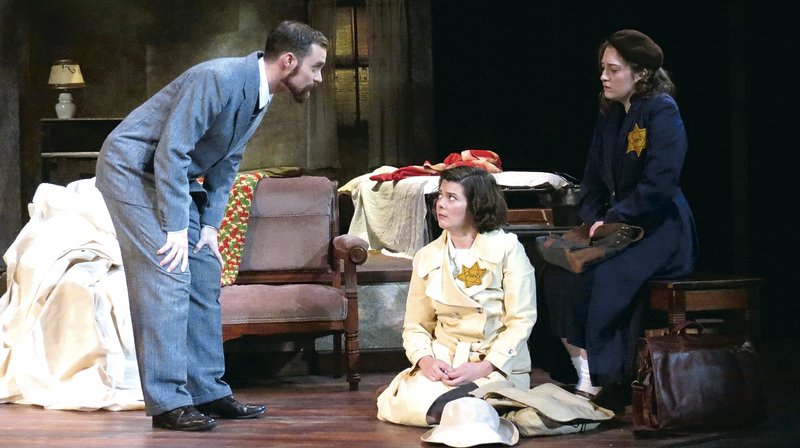The University of Arkansas department of theatre's production of "The Diary of Anne Frank," a drama based on the diaries written by 13-year-old Anne Frank during the German occupation of the Netherlands, opens with somber, reverberating clock chimes. Three members of the Frank family -- Anne's father, mother and sister -- slowly climb a staircase to a loft-like space, trepidation and dread in their every step. Only 13-year-old Anne, the baby of the family, trips lightly up the stairs, scampering from room-to-room in the cramped space. She investigates her new surroundings as though she were on a grand adventure, not a member of a Jewish family hiding from Nazi soldiers in the 1942 German-occupied Netherlands.
Actor Halley Mayo, who portrays her on stage, says that Anne's optimism in the face of such dismal circumstances is to be admired.
FAQ
‘The Diary of Anne Frank’
WHEN — 7:30 p.m. today & Saturday; 2 p.m. Sunday; again Oct. 6-9
WHERE — University Theatre in the Fine Arts Center, 340 N. Garland, Fayetteville
COST — $5-$20
INFO — theatre.uark.edu
"My hope is that people see the resilience and tenacity Anne possessed," says Mayo. "She never wavered in her beliefs despite the horrific circumstances she lived under the last two years of her young life."
Mayo finds parallels in the story of the Frank family and the world events of today.
"There was a wonderful article in the New York Times recently about today's Anne Frank being a Syrian girl. I was so moved by that article. Otto Frank applied for visas to the United States before he took his family into hiding, and he wasn't granted them. It makes me so emotional to know this is happening today.
"I was ignorant to what is happening in Syria, and I think making the comparison is astute and significant."
Director Kate Frank finds parallels even closer to home.
"When we work on something in a play that seems far away from our own life experience, we use a tool that we call an 'as if'," Frank says. "One of my 'as ifs' for this play was, I imagined being a young person walking down the street with my family, and my father being harassed and brutalized by the police. The police are so strong and so scary that we can only stand back and watch or else we might also be targeted.
"And then I thought: This must be what it is like to be black in America."
Department chairman Michael Riha believes that the production has an important message to convey to playgoers in 2016.
"I ... believe that one of the most important aspects of what we do as theater artists and educators is that we provide opportunities for students, faculty and audience members to develop an even stronger sense of empathy. As we look at our daily news headlines, it seems quite clear to me that the world could benefit greatly by everyone possessing just a bit more empathy for each other."
Riha says that the new translation by Wendy Kesselman will offer insights even to those who have seen previous performances of the story.
"[The Kesselman adaptation] further enhances Frances Goodrich and Albert Hackett's beautifully written script with new passages that were retracted by Otto Frank from the original published manuscript of Anne Frank's personal diary."
Both Frank and Mayo agree that portraying historical characters and events carries with it a certain responsibility.
"I do feel the weight and energies of the people who actually lived through the subject of the play," says Frank. "I have to do a good deal of research so that I have a fairly detailed understanding of what happened. Then, I try to get at the truth of what the characters are experiencing in the play without adding the knowledge that we now have, in hindsight, about the event."
"Everyone who comes into the theater will have their [own] ideas about who Anne was and what she means to them," says Mayo. "There's also a weight from wanting to do her justice."
Despite the bleak subject of the play, Mayo says, Anne's story is one of hope and optimism.
"I hope people don't leave feeling sad. [Anne] longed to spread happiness to the world. I hope people leave the theater feeling the same way. She wrote that she believed people were really good at heart, and I hope the audience can recognize that goodness in themselves and everyone."
NAN What's Up on 09/30/2016
